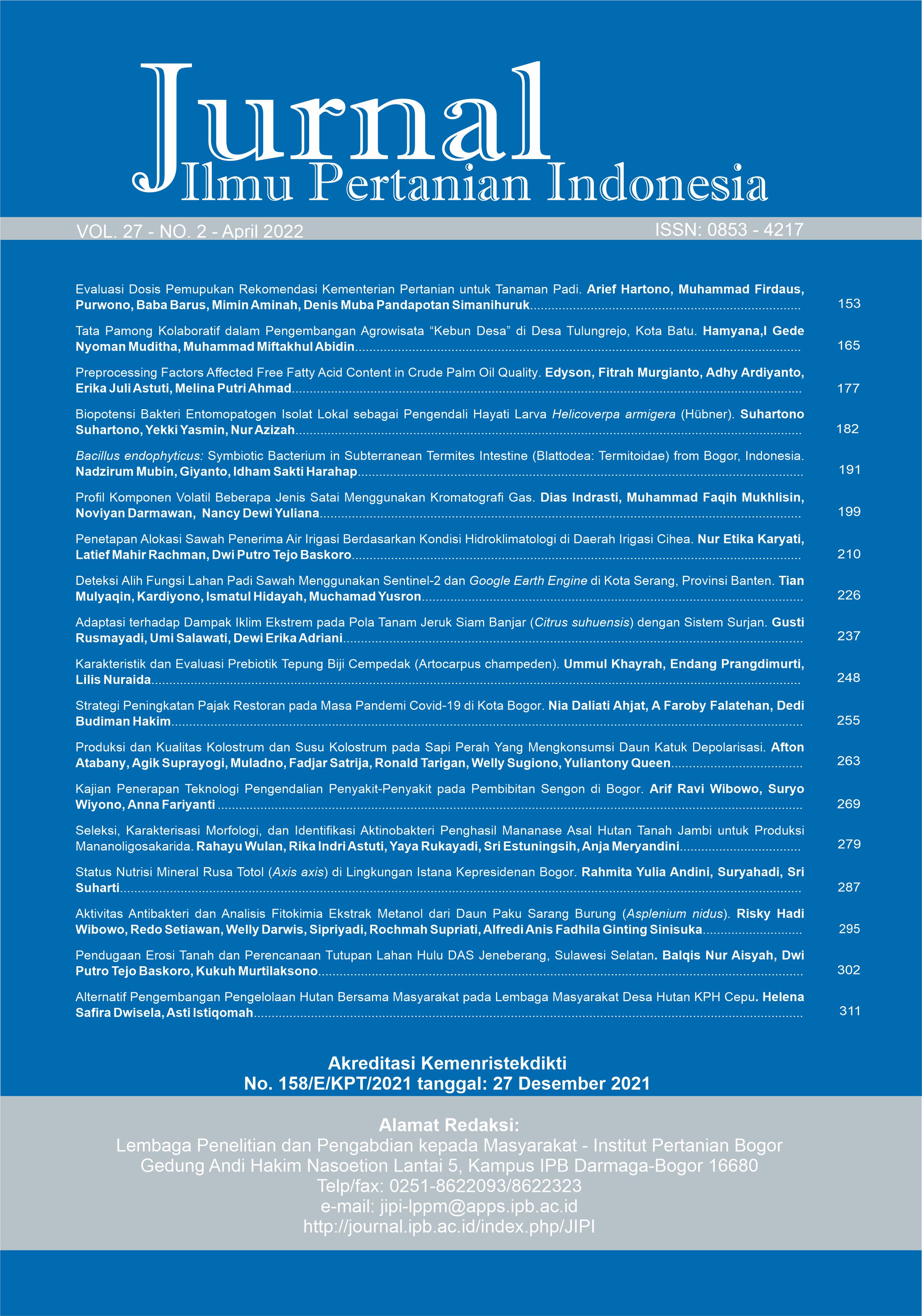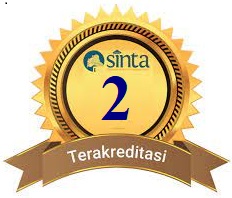Bacillus endophyticus: Symbiotic Bacterium in Subterranean Termites Intestine (Blattodea: Termitoidae) from Bogor, Indonesia
Abstract
Rayap merupakan serangga sosial yang berperan penting dalam perputaran siklus nutrisi. Di dalam sistem pencernaan rayap, terdapat simbion yang membantu proses degradasi selulosa. Penelitian ini bertujuan mengisolasi bakteri simbion yang terdapat di dalam saluran cerna rayap tanah. Penelitian diawali dengan koleksi rayap tanah di Kampus IPB University, diikuti isolasi bakteri simbion dari saluran cerna belakang (proktodeum) yang kemudian diidentifikasi berdasarkan morfologi, fisiologi, dan molekuler menggunakan gen 16S rRNA. Enam rayap tanah yang diperoleh adalah Macrotermes gilvus, Odontotermes javanicus, Microtermes insperatus, dan Capritermes mohri (Famili Termitidae); Schedorhinotermes javanicus dan Coptotermes curvignathus (Famili Rhinotermitidae). Dari enam rayap diperoleh 43 isolat dan satu isolat yang memiliki karakter umum. Isolat bakteri kode 8A_27F berwarna putih, elevasi seperti tombol dengan tepian licin. Dari uji fisiologis, isolat ini termasuk ke dalam bakteri Gram positif, berspora, dan bersifat aerob. Identifikasi dengan gen 16S rRNA menunjukkan bahwa isolat bakteri tersebut memiliki tingkat kemiripan sebesar 98% dengan spesies Bacillus endophyticus.
Kata kunci: bakteri, rayap, 16S rRNA, simbion, proktodeum
Downloads
References
Ahmad M. 1959. Key to The Indomalayan Termites. Lahore (PK): University of The Punjabi.
Djunaid A, Yastrib I, Arif A, Muin M. 2019. Composition of bacteria types in the guts of Odontotermes sp. and Coptotermes sp. preliminary study. The 1st Biennial Conference on Tropical Biodiversity. https://doi.org/10.1088/1755-1315/270/1/012013
Eggleton P, Bignell DE, Hauser S, Dibog L, Norgrove L, Madong B. 2002. Termite diversity across an anthropogenic disturbance gradient in the humid forest zone of West Africa. Agriculture, Ecosystems & Environment. 90: 189202. https://doi.org/ 10.1016/S0167-8809(01)00206-7
Eutick MI, O'Brien RW, Slaytor M. 1978. Bacteria from the gut of Australian Termites. Applied and Environmental Microbiology. 35(5): 823828. https://doi.org/10.1128/aem.35.5.823-828.1978
Febriyanto A. 2013. Karakterisasi dan identifikasi bakteri selulolitik simbion usus belakang rayap pekerja Macrotermes gilvus. [skripsi]. Bogor (ID): Institut Pertanian Bogor.
Freymann BP, Buitenwerf R, Desouza O, Olff H. 2008. The importance of termites (Isoptera) for the recycling of herbivore dung in tropical ecosystems: a review. European Journal of Entomology. 105(2): 165173. https://doi.org/10.14411/eje.2008.025
Krishna K. 1969. Introduction. Di dalam: Krishna K, Weesner FM, editor. Biology of Termites. New York (US): Academic Press Inc. hlm 117. https://doi.org/10.1016/B978-0-12-395529-6.5000 5-2
Lane DJ. 1991. 16S/23S rRNA sequencing. In: Nucleic acid techniques in bacterial systematics. Stackebrandt, E., and Goodfellow, M., eds., John Wiley and Sons, New York, NY, pp. 115175.
Mackenzie LM, Muigai AT, Osir EO, Lwande W, Keller M, Toledo G, Boga HI 2007. Bacterial diversity in the intestinal tract of the fungus cultivating termite Macrotermes michaelseni (Sjöstedt). African Journal of Biotechnolog. 6(6): 658667.
Misaghi IJ, Donndelinger CR. 1990. Endophytic bacteria in symptom-free cotton plants. Phytopathology. 9(1): 808811. https://doi.org/ 10.1094/Phyto-80-808
Paul B, Khan MA, Shankarganesh, Chakravorty S. 2018. Termites and Indian Agriculture, chapter 3. In: Termites and Sustainable Management, Khan MA and Ahmad W. Springer International Publishing AG. https://doi.org/10.1007/978-3-319-68726-1_3
Pleban S, Sørensen J. 1996. Multi-target and mediumindependent fungal antagonism by hydrolytic enzymes in Paenibacillus polymyxa and Bacillus pumilus strains from barley rhizosphere. FEMS Microbiology Ecology. 22: 183192. https://doi.org/10.1111/j.1574-6941.1997.tb0037 0.x
Pribadi T, Raffiudin R, Harahap IS. 2011.Termites community as environmental bioindicators in highlands: a case study in eastern slopes of Mount Slamet, Central Java. Biodiversitas. 12: 235240. https://doi.org/10.13057/biodiv/d120409
Reva O, Priest FG. 2002. Bacillus endophyticus sp. nov., isolated from the inner tissues of cotton plants (Gossypium sp.). International Journal of Systematic and Evolutionary Microbiology. 52: Salunke BK, Salunkhe
RC, Dhotre DP, Khandagale AB, Walujkar SA, Kirwale GS, Ghate HV, Patole MS, Shouche YS. 2010.
DiversityofWolbachia inOdontotermes spp. (Termitidae) and Coptotermes heimi (Rhinotermitidae) using the multigene approach. FEMS Microbiology Letters. 307(1): 5564. https://doi.org/10.1111/j.1574-6968.2010.01 960.x
Sambrook J, Fritsch EF, Maniatis T. 1989. Molecular Cloning: A Laboratorium Manual Second Edition. New York (US): Cold Spring Harbor Laboratory Press.
Schaad NW, Jones JB, Chun W. 2001. Laboratory Guide for Identification of : PLANT PATHOGENIC BACTERIA, 3rd edition. Minnesota (US): The American Phytopathological Society.
Shinzato N, Muramatsu M, Matsui T, Watanabe Y. 2005. Molecular Phylogenetic diversity of the bacterial community in the gut of the termites Coptotermes formosanus. Biosci Biotech Bichem. 69(6): 11451155. https://doi.org/10.1271/bbb. 69.1145
Shinzato N, Muramatsu M, Matsui T. 2007. Phylogenetic Analysis of the Gut Bacterial Microflora of the Fungus-Growing Termite Odontotermes formosanus. Bioscience, Biotechnology, and Biochemistry. 71(4): https:// doi.org/10.1271/bbb.60540
Tamura K, Peterson D, Peterson N, Stecher G, Nei M, Kumar S. 2011. MEGA5: Molecular evolutionary genetics analysis using maximum likelihood, evolutionary distance, and maximum parsimony methods. Molecular Biology and Evolution. 10: 27312739. https://doi.org/10.1093/molbev/msr121
Tarumingkeng RC. 1971. Biologi dan Pengendalian Rayap Perusak Kayu Indonesia. Bogor (ID): LPPK.
Tho YP. 1992. Termites of Peninsular Malaysia. Kirton LG, editor. Kepong, Kuala Lumpur (MY): Malayan Forest Records.
Turner S, Pryer KM, Miao VPW, Palmer JD. 1999. Investigating deep phylogenetic relationships among cyanobacteria and plastids by small subunit rRNA sequence analysis. Journal of Eukaryotic Microbiology. 46: 327338. https://doi.org/ 10.1111/j.1550-7408.1999.tb04612.x
This journal is published under the terms of the Creative Commons Attribution-NonCommercial 4.0 International License. Authors who publish with this journal agree to the following terms: Authors retain copyright and grant the journal right of first publication with the work simultaneously licensed under a Creative Commons Attribution-NonCommercial 4.0 International License. Attribution — You must give appropriate credit, provide a link to the license, and indicate if changes were made. You may do so in any reasonable manner, but not in any way that suggests the licensor endorses you or your use. NonCommercial — You may not use the material for commercial purposes.























